
[...] V ercingetorix, Celtilli filius, Aruernus, summae potentiae adulescens, cuius pater principatum Galliae totius obtinuerat et ob eam causam, quod regnum appetebat, ab ciuitate erat interfectus, conuocatis suis clientibus facile incendit. Cognito eius consilio ad arma concurritur. Prohibetur ab Gobannitione, patruo suo, reliquisque principibus, qui hanc temptandam fortunam non existimabant ; expellitur ex oppido Gergouia ; non desistit tamen atque in agris habet delectum egentium ac perditorum. Hac coacta manu quoscumque adit ex ciuitate ad suam sententiam perducit ; hortatur ut communis libertatis causa arma capiant, magnisque coactis copiis aduersarios suos, a quibus paulo ante erat eiectus, expellit ex ciuitate. Rex ab suis appellatur. Dimittit quoque uersus legationes ; obtestatur ut in fide maneant. Celeriter sibi Senones, Parisios, Pictones, Cadurcos, Turonos, Aulercos, Lemouices, Andos reliquosque omnes qui Oceanum adtingunt adiungit ; omnium consensu ad eum defertur imperium. Qua oblata potestate omnibus his ciuitatibus obsides imperat, certum numerum militum ad se celeriter adduci iubet, armorum quantum quaeque ciuitas domi quodque ante tempus efficiat constituit ; in primis equitatui studet. Summae diligentiae summam imperii seueritatem addit ; magnitudine supplicii dubitantes cogit. Nam maiore commisso delicto igni atque omnibus tormentis necat, leuiore de causa auribus desectis aut singulis effossis oculis Remitti domum, ut sint documento relics and magnitudine poenae perterreant alios. [...]
[...] a very powerful young Arverne, Vercingetorix, son of Celtillos, who had held the first rank in the Gaul, and that his city had to die because he was to royalty, assembles its customers and heats easily. As soon as one knows his purpose, we run to arms; Gobannitio his uncle, and other leaders who did not consider about running such a chance, the hunt for the city of Gergovie. However it does not renounce his project, and rises in the countryside a body of vagabonds and miserable. Monitoring This troupe he brings to his views of the city all those he meets, he urges them to take up arms for the common liberty. Having gathered a large force, he expels his opponents around the country who, shortly before, had driven himself. He was given the title of king, and sends MPs demand throughout the execution of the promises that were made. Soon he leads Senones, Parisii Pictones, Cadurci, Turons the Aulerci the Lemovices, the Andes, and all other nations bordering the ocean, all agreed to defer the command. Coated such authority, he demands hostages from all the cities, giving orders that he then promptly a number of soldiers, and rule that every city must make weapons, and when she will deliver. Mostly it deals with the cavalry to the activity he most attached the greatest severity and determines the uncertainty by the enormity of the punishment, a felony is punished by fire and every sort of torture; for minor offenses he cut the ears or puncture an eye, and returns home to the guilty and serve as an example to scare others by rigor of execution. [...]

Statue of Vercingetorix on the presumed site of Alesia Alise-Sainte-Reine in Burgundy
The Aedui and Vercingetorix
The news of the defection of Aedui spread the war. Deputations were sent to all points, credit, authority, money, everything is being used to win the states. Wealthy hostages whom Caesar had deposited with them, they threaten to destroy them to frighten those who hesitate. The Aedui invite Vercingetorix to come to confer with them on ways of making war. He went to their prayer, but they claim that they referred the chief command, and as he played them, we shall call a meeting of all Gaul to Bibracte. We went there in droves from all sides. The issue is subject to the votes of the multitude, and all confirm the choice as chief Vercingetorix. We saw no such meeting the Remi, Lingones the Treviri first two peoples, because they remained faithful to the Romans, the Treveri because they were too far away and pressed further by the Germans, which was why they took no part in the war, and kept neutral. The Aedui suffered strongly be stripped of command and they lamented the change in their fortunes, and regretted the kindness of Caesar to them, but as the war had begun, they dared not separate their cause from the other Gauls . It was only reluctantly qu'Éporédorix Viridomarus and young people of high expectation, obeyed Vercingetorix.

Portrait of Julius Caesar; excavations of the Rhone, Arles
Plans Vercingetorix It demands hostages from other nations, sets the day they will be delivered, ordered the prompt meeting of all the cavalry, high of fifteen thousand men, and says "he is content with the infantry has already, he does not want to tempt fate weapons in battle, with a numerous cavalry he will be very easy to cut funding to the Romans and disturb their foraging; only the Gauls are resigned to destroy their crops and burn their houses and see these losses in the domestic way of regaining their independence forever and freedom. "Things being thus arranged, he ordered the Aedui and Segusiavi, bordering the province, to raise ten thousand infantry ; and there adds eight hundred horsemen. He confided the command of these troops Eporedorix brother, and told him to take the war to the Savoyards. On the other hand, it sends the Gabali and closest townships Arverni to ravage the territory of Helviens, and Ruteni Cadurci and that of Volques Arécomiques. At the same time, and secret messages, it seeks Allobroges hoping that the resentment of the last war were not yet extinguished. He promises to Heads of money, and the nation's sovereignty throughout the province.
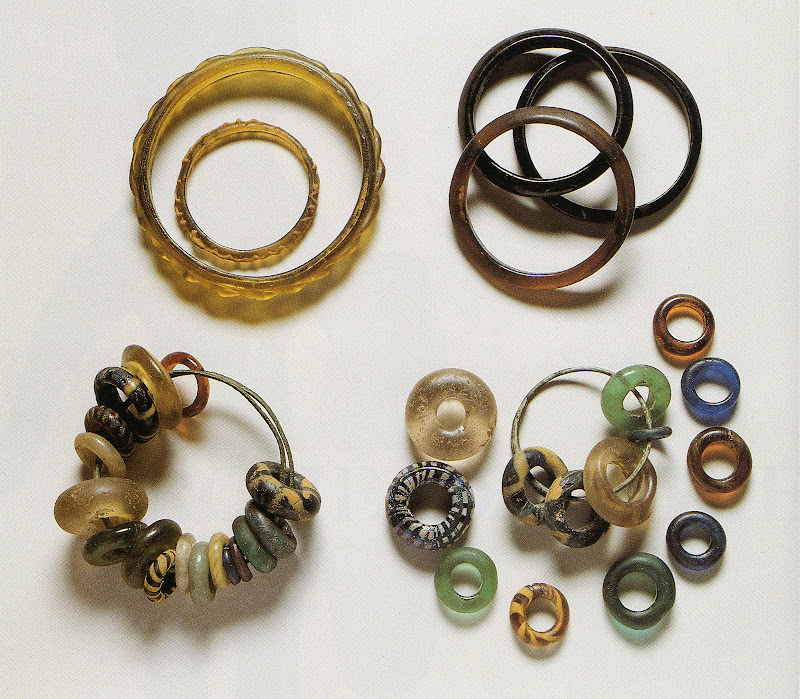
Glass Bracelets - Mathay Mandeure (Doubs)
Caesar brought riders siblings
To resist these attacks, Lieutenant L. Caesar had to distribute, as garrison throughout the province, only twenty-two cohorts drawn from the same province. The Helvii spontaneously attack their neighbors are defeated, losing C. Domnotaurus Valerius, son of Caburus, leader of their nation, and are driven into the walls of their cities. The Savoyards, who settled near the Rhone many positions, put a lot of zeal and diligence in defending their territory. Caesar, seeing that the enemy is superior in cavalry, he closes all the roads, and there is no way to get relief from Italy or the province, sent beyond Rhine in Germany, about the people he had submitted in previous years, and asked for their riders and the lightly armed infantrymen, accustomed to mingle with the cavalry in fighting. Upon their arrival, not finding enough well-trained horses which they used, he took those of the tribunes, the other officers, and even Roman knights and veterans, and handed to the Germans.
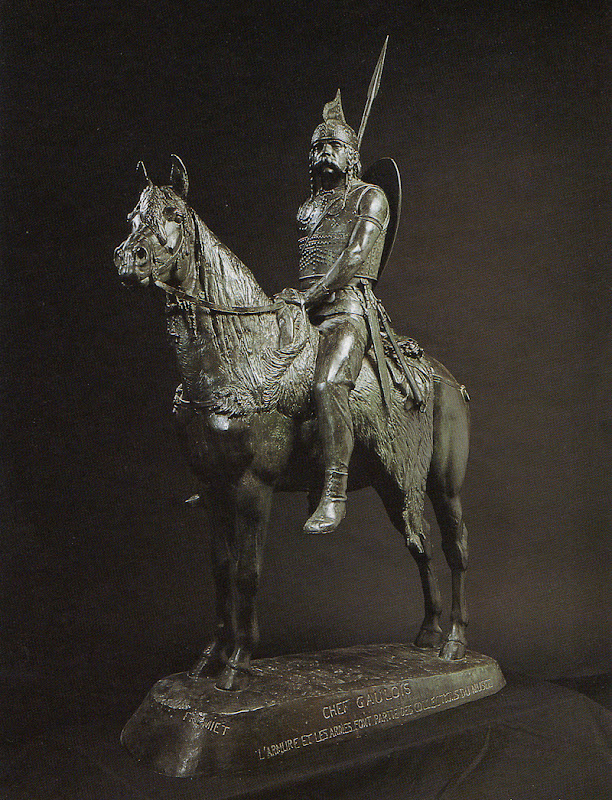
Emmanuel Fremiet - Rider Gallic
defeats the Gallic cavalry
During the time spent in all these things, enemies sent by the body and Arverni the cavalry closed in all states of Gaul came together. Finding himself at the head of so many troops, and while Caesar was headed by the Sequani extreme border Lingones, easier to carry relief to the province, Vercingetorix came in three camps, take a position about ten miles of the Romans, and having summoned the heads of the cavalry, he said: "That the time has come to conquer, that the Romans flee and abandon their province of Gaul, that is enough for the freedom of time, not enough for peace and Rest of the future, they will surely come back with greater strength, and will do no end to the war. We must therefore attack them in an awkward of their march, and if the infantry come to the aid of their cavalry and are thus arrested, they will complete their course; if (what seems more likely), they abandoned their luggage for not only fill their safety, they will lose, in addition to honor their most vital resources. As for their riders, none of them dare come forward only out of line and should not even doubt it. Moreover, to further inspire courage in his troops, and more fear to the enemy, he put the whole army in front of the camp. "Riders need to cry that everyone agrees with the most sacred oath not to enter his home, never see his children, his family, his wife, he has twice crossed the ranks of the enemy.

It approves the proposal, and all lend this oath. The next day, the cavalry is divided into three bodies, two of which show on our wings, while the center is in front of our vanguard to close her passage. Informed of their intentions, Caesar also formed three divisions of his cavalry, and marched against the enemy. The battle began on all sides at once: the army halted; the bags are placed between the legions. If our riders on a flex point, or are too hard pressed, Caesar did carry signs and march cohorts, which stops enemies in their pursuit by our soldiers and revives the hope of a speedy rescue. Finally, the Germans, on the right flank, earning the top of a hill, drove the enemy, pursued them to a river where Vercingetorix had placed his foot, and kill many. Witnesses of this defeat the Gauls, fearful of being surrounded, fled. It was more carnage everywhere. Aedui three of the highest distinction are taken and brought Caesar: Coto, commander of the cavalry, who in the past comitia had been in competition with Convictolitanis; Cavarillos, which, after the defection of Litavicus, was given command of the infantry and Eporedorix, that Aedui before Caesar's arrival, had to head in their war against the Sequani.

Arverne gold stater in the legend Vercingetorix
Vercingetorix at Alesia . Caesar follows
Seeing all his cavalry to flight, Vercingetorix led back the troops he had arranged before the camp, and immediately took the path of Alesia, which is a city of Mandubii, after having made in haste, out of the camp baggage that followed him. Caesar left his crew on a neighboring hill, to commit the custody of two legions, pursued the enemy as long as daylight lasted, killed about three thousand men of the rearguard, and encamped the next day before Alesia. Having recognized the situation of the city, and seeing the enemy dismayed the defeat of their cavalry, which they regarded as the main strength of their army, he exhorted his people to work and made start lines circumvallation.
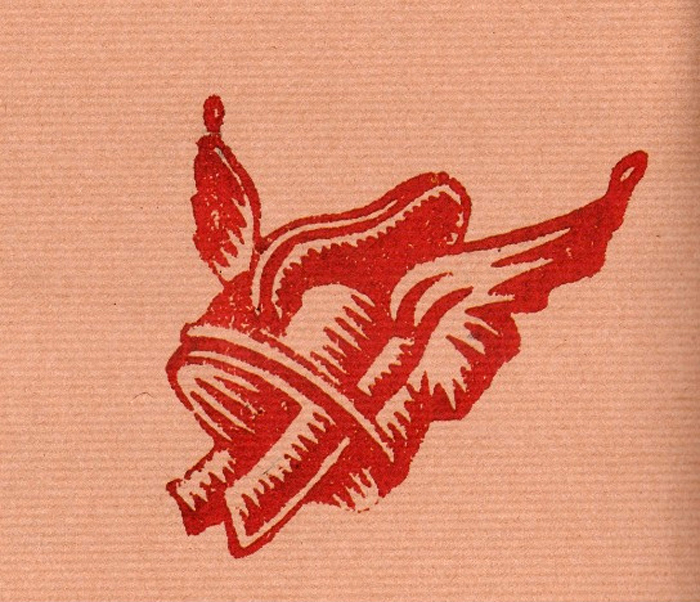
Gallic Helmet retail package of Gauloises, Janco model 1936
site of Alesia. Positions of both armies
This place was located atop a mountain in a position so high that it seemed not to be taken by a siege. At the foot of this mountain two rivers flowed from two different sides. Before the town lay a plain about three miles in length on all other points, hills around him, little distant from each other and of equal height. Under the walls, the side that looked at the rising sun was covered in its whole extent, with Gallic troops before them a ditch and a wall of dry six feet high. Circumvallation line formed by the Romans held a tour of eleven miles. Our camp was sitting in an advantageous position, and there raised twenty-three strong positions in which were placed during the day to prevent any sudden attack, there was also the night of the sentinels and strong garrisons.

Portrait of Caesar on one of the denarius of L. Flaminius Chilo (43 av. JC)
defeats the Gallic cavalry
During construction, there was a cavalry battle in the plains interspersed with hills and stretching in a space three miles, as we said above. The determination was equal on both sides. Ours begins to suffer, Caesar sent the Germans to support them, and placed the legions before the camp, in case the enemy infantry was suddenly some attempt. This support of legions raised the courage of our horse, and the Gauls put to flight bother by their number and crammed too close to doors that remain. Then the Germans pursue them deeply to their entrenchments, we made a great slaughter. Several abandoning their horses, trying to cross the ditch and climb the wall. Caesar did make a move before the legions he had placed at the head of the camp. This movement brings the same fear among the Gauls who were behind the entrenchments, believing it reaches them, they cry to arms, few are rushing into the city with fear. Vercingetorix closed the doors, lest the camp was totally abandoned. This Only after having killed many people and taken a large number of horses, as the Germans withdrew.

Aerial view of Mont Auxois, site of the Battle of Alesia
Vercingetorix sends its riders and asked for help
Vercingetorix, before the Romans had completed their circumvallation, resolved to send all his cavalry by night. Before the departure of the horsemen, he recommends that they "go in their respective countries and enlist those who are old enough to bear arms; it reminds them of what he has done for them, beg to ensure her safety and not abandon it, he who has deserved well of the common liberty, to thank you for the cruel enemies, their negligence would, with his loss, that eighty thousand chosen men, he has no balance, food for thirty days, but it may, with the gentle, take a little longer. "After these recommendations it made in silence from his cavalry at the second watch, by the interval that left our lines again. It is made all the corn in the city, and establishes the death penalty against those who will not, as to which cattle Mandubii had collected a large supply, it distributes the head, the grain is measured with savings and given in small quantities and it is entering the city all the troops encamped under its walls. That is the way he prepares to await rescue of Gaul and to support the war.

Map siege of Alesia
work around Alesia Caesar
informed of these provisions by defectors and prisoners, Caesar stopped his plan of fortification as follows. He dug a ditch twenty feet wide, the sides were steep and the depth equal to the width. Everything else was set to retrenchments four hundred feet behind the ditch, he wanted in there (because they had been obliged to embrace such a large space, our soldiers could not easily fill in all points) prevent attacks or sudden eruptions at night, daytime and ensure our workers traits of the enemy. In this space, Caesar drew two trenches fifteen feet wide and as deep, and whoever was inside and dug in a low land and uncultivated, was filled with water drawn from river. Behind these gaps, he built a terrace and a rampart of twelve feet, and he added a parapet and battlements, and erected large pieces of wood split at the junction of the parapet and the wall, to make the first more difficult for enemies. All the work was flanked by towers, placed at eighty feet from each other.
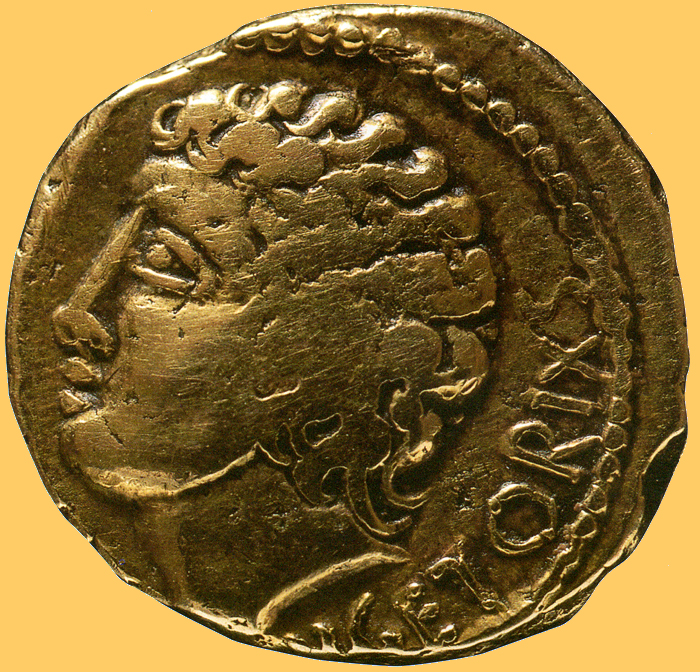
Vercingetorix stater on a gold
It was at the same time fetching firewood and food, and use the great work entrenchments troops, minus those that employed in the distance. Often even the Gauls were trying to disturb our workers, and made several trips doors vigoureuses.César thought most necessary to add something to the corner, so that a smaller number of soldiers could defend them. To this end, they cut tree trunks and large branches and were stripped of their bark and are sharpened by the summit and then we opened a trench five feet deep, where they drove the piles bound by the foot so that it can not be uprooted, showed only the upper part. There were five rows, joined together and interleaved; anyone who was involved was tangled in their sharp points - our soldiers called them vines -. In front were obliquely staggered pits three feet deep, which is gradually narrowed down to the bottom. It ushered piles round the size of the thigh, hardened in the fire and sharpened at the end, which only came out of land only four fingers, and to strengthen and consolidate the work is heavily trod the earth with feet, the rest was covered with brambles and bushes, to hide the trap. It was formed eight rows this species, three feet away from each other: they were called lilies because of their resemblance to the flower. In front of all were the pitfalls of a foot long and armed with iron spikes, which had been driven into the ground, we had them everywhere, at short distances from each other, they were called prods.

This work was done, Caesar shoot in the field as plain as could offer the kind of places, and in a circuit of fourteen miles, a contravallation similar, but the opposite side, against the external enemy. He wanted that in case of attack, during his absence, the retrenchments might not be invested with a great multitude. Finally, to prevent the dangers that troops could be exposed while leaving the camp, he ordered that each appealed fodder and food for thirty days.

kantharos money found during excavations at Alesia
Gallic relief army
While this was going to Alesia, the main Gaul, in assembly, had solved, no call to arms all those who were able to wear them, as was Vercingetorix, but require each nation a number of men they feared, in the confusion of so great a multitude , not power or discipline, nor recognize or food. It was resolved that the various states provide, namely Aedui with their customers Segusiavi, Ambivareti, the Aulerci Brannovices the Blannovii, thirty-five thousand men with the Arverni peoples within their control, such as Eleutètes, Cadurci, Gabali, Vellavii and a like number; Senones, Sequani, Bituriges the Santon, Ruteni the Carnutes each twelve thousand Bellovaci the ten thousand, the Lémoviques as much; Pictones, the Turones, Parisii, Helvetii eight miles each, the Ambiens, the Mediom the Petrocorii the Nervii, the Morini, the Nitiobroges, each five miles; the Aulerci Cenomani same; the Atrebates, four thousand; the Veliocasses the Lexovii the Aulerci Eburovices, each three miles, Rauraci with the Boii, a thousand, twenty thousand to all the peoples along the ocean, and that the Gauls used to call Armoricans, among which are the Curiosolites, give them back the Ambibarii the Caletes the Osismii the Lemovices the Vnelles. The Bellovaci only refused their quota, claiming they wanted the war to the Romans on their behalf and at their discretion, without orders from anyone. However, at the urging of Commios, their ally, they sent two thousand men.
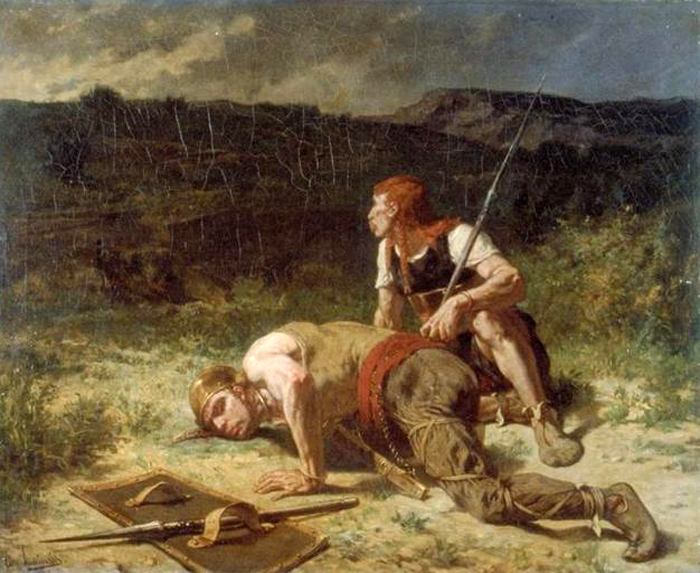
Luminais Evariste-Vital (1822-1896) - The scouts Gallic
Commios was the same with Caesar, as we have earlier, had served as a faithful agent useful in the war of Britain, a few years ago, and in recognition of his services, Caesar had freed his nation from all tribute, delivered him his rights and laws and subject the Morini. But such was the eagerness of the Gauls Universal to regain their freedom and regain their former military glory, that neither the benefits nor the memories of friendship could not touch them, and that no sacrifice will cost to their zeal, they gathered eight thousand horsemen and about two hundred and forty thousand infantry. These troops were reviewed and counting was done in the territory of Aedui; they chose leaders, and the overall command was given to the Atrebatian Commios, and to Aedui Viridomarus Eporedorix, and Arverne Vercassivellaunos, cousin of Vercingetorix. They were given a council consisting of officers from each city to conduct the war. All go to Alesia, full of ardor and confidence, none believed it was possible to support only the appearance of so great a multitude, especially in a double battle when the Romans were pressed by both the out of the besieged and surrounded outside by both cavalry and infantry.
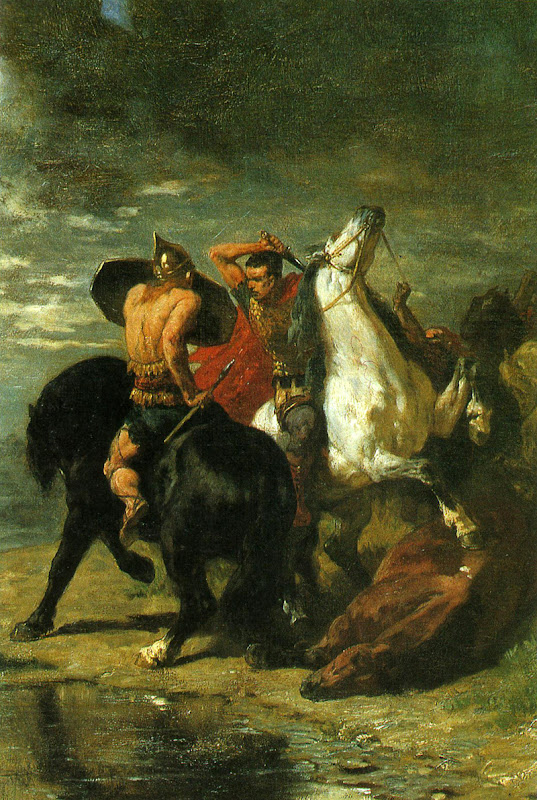
"Battle of Romans and Gauls", oil on canvas by Evariste-Vital Luminais (1822 -1896)
Speech Critognatos
But the Gauls besieged in Alesia, seeing that day they waited for help had expired, and all their corn was consumed, ignoring what was happening elsewhere cite the Aedui, had assembled in council and deliberated on the party they had to take. Among the various opinions, some of which wanted to be surrendered and the others that Temptation a vigorous sortie while they still had enough strength, we can not, I think, ignore the speeches Critognatos, because of its singular and horrible cruelty. It was a Chieftain of a high birth and who enjoyed a high consideration. "I will not speak, he said, in the opinion of those who call the name of the most shameful capitulation slavery, and I think we should, nor count the number of citizens, nor admit that meeting. I am speaking to those who offer an outlet, and whose opinion, as you acknowledge all testify that they still remember our ancient value. But it is rather the weakness of Courage to can not handle a few days of starvation. Men available to death without hesitation are easier to find than those who can endure pain. And I too share this view (as has the honor of empire on me), I could not see the peril for our lives, but in the party we have to take, consider all Gaul we called to our aid. When eighty thousand men have perished in the attempt, what courage do you maintain that our parents and relatives, if they can, so to speak, fight on our bodies? Beware thus depriving your support to those who were not afraid to expose for your salvation, and, by precipitation, by recklessness, by cowardice, do not engage all Gaul in the degradation of perpetual slavery. Because your aids are not arrived at the appointed day, you doubt their faith and their steadfastness? What! when the Romans are working every day to new trenches, do you think it is only to be held in suspense? If any road is closed by you where you might hear from them, the Romans themselves do not they assure their arrival by the next work day and night show enough fear they have? What is My opinion? To do what our ancestors did in their wars, though less fatal, against the Cimbri and Teutons. Forced, like us, to shut themselves in their cities, plagued by hunger, they maintained their lives by eating the flesh of those whose age rendered unnecessary war, and they went point. If we had not received this example, I would say that for the cause of freedom, it would be glorious to give it to our descendents. What war can indeed be compared to it? The Cimbri, after ravaging Gaul, and having made him great pain, finally out of our territory, and gained further lands, and they left us our rights, our laws, our fields, our freedom! But the demands of the Romans? What do they want? The urge to take against those whose fame has made them experience the glory and power in the war, they want to settle on their territory, in their cities, and impose the yoke of eternal servitude. Because they have never gone to war in other views. If you do not know how they behave in distant nations, see this part of Gaul that touches you, reduced to a province, deprived of its rights and its laws, subject to the axes Roman, it groans under the weight of slavery that must not end.
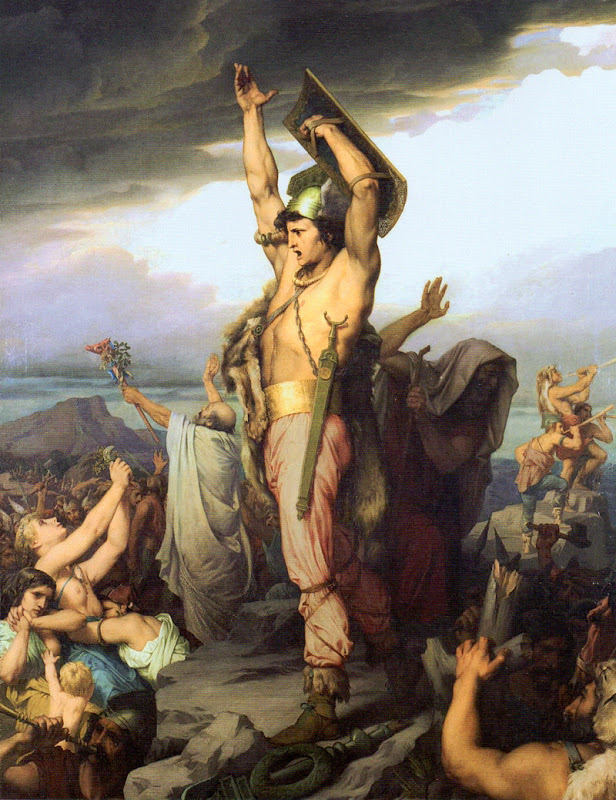
François-Emile Ehrmann (1833-1910) - Vercingetorix calls to the Gauls for the defense of Alesia, 1869
Expulsion of non-combatants
Opinions have been collected, it was decreed that those who, because of their health or age, could not render service to the war, left the place, and we would try everything before coming Critognatos proposed by the party. It was decided, however, that if we There was constrained and if help were made to wait too long, it would follow rather than surrender or submit to the law of the Romans. The Mandubii, who had received in their town, are forced to leave with their children and women. They approach the fortifications of the Romans, and, bursting into tears, they asked, they beg for slavery and bread. But Caesar placed guards on the rampart, forbade them should receive.
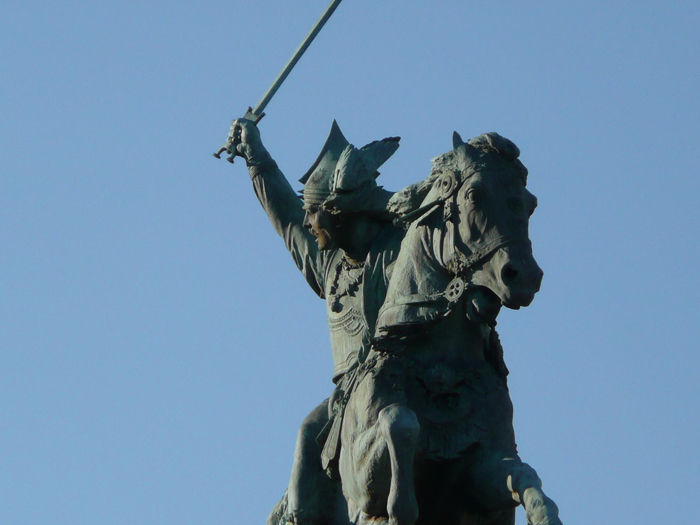
Equestrian Statue of Vercingetorix by Bartholdi (1834-1904), Place de Clermont-Ferrand Jaude
Arrival of the relief army
However Commios and other leaders, invested with supreme command, arrived with all their forces to Alesia, and take a position on the hills surrounding the plain at the distance of a mile not over our limit. Having done the next day the cavalry out of their camp, they cover all the plain that we have said three miles in extent, and shall, not far away, hidden up their troops on the heights. We saw all of Alesia was happening in the campaign. In view of this emergency, there is a rush, we congratulate each other, and all minds are in joy. It brought out all the troops who fall into place before, it fills the first gap, it is covered with hurdles and clay, and are preparing to exit and all events.

Pence (48 BC.) - AVER: LII. Diadémée head of Clemente in right. SETBACKS: CAESAR. Trophy fused to an apex and a shield.
Victory Roman Cavalry
Caesar, who arranged the whole army on one and another of his lines, so everyone knew that, if necessary the position he would occupy him out of his camp the cavalry, which he ordered to commit the case. From the summit of the heights that the camps occupied, we had seen on the battlefield, and all soldiers in combat alert, pending the outcome. The Gauls had mingled with their cavalry a few archers and light-armed infantry, both for support if it folded, only to stop the shock from ours. Several of our riders, surprised by these soldiers, were wounded and forced to leave the fray. The Gauls, believing that their were over, and ours were overwhelmed by numbers, began, under siege and surrogates, to push all sides shouting and screaming to encourage those of their nation. As the action happening before the eyes of both parties, no act of courage or cowardice could not escape the eye, and it was excited side to behave well, the desire for fame and fear of shame. They had fought from noon until sunset, and the victory was still uncertain when the Germans, gathered on one point, tight squad, rushed on the enemy and repulsed. The archers, abandoned in the rout, were surrounded and cut to pieces, and pursued the fugitives on all sides to their camp, we gave them no time to rally. Then those who were out of Alesia, dismayed and almost despairing of victory, returned to the place.

Pence 46-45 BC. JC representing a trophy of arms, a captive and captive, legend CAESAR (Caesar)
unsuccessful attack on Roman lines
After a day used by the Gauls to make a lot of hurdles , ladders and spears, they leave quietly their camp in the middle of the night and approach those who watched our trenches on the plain. Suddenly screaming, which was warning signal of their approach that we take those besieged, they throw their screens, attacked the guards of our walls with slings, arrows and stones, and make all provisions for storm . At the same time, Vercingetorix, hearing the cries from outside, gives the signal with the trumpet and brought out his own space. Our soldiers took positions on the wall that had been the previous days, assigned to each of them and terrify the enemy by the amount of slings, darts, balls lead, stone, they had amassed in the trenches, and they overwhelm them. As the night prevented him from seeing each other, there were many on both sides wounded, machinery rained traits. But the lieutenant and Mr. Antonius C. Trebonius, who had fallen defending the attacked areas, more distant forts fired a few troops to rescue the Legionnaires on the points where they knew pressed by the enemy.

Dying Gaul
As long as the Gauls fought far from the trenches, they incommodèrent us much by the large amount of their features, but when they were more advanced, he came or they fell upon the thorns they did not see, or they pierced themselves falling into ditches filled with piles, or they perished finally launched the guise of the ramparts and towers. After losing a lot of people, without being able to enter the corner, saw the day approaching, and fearing to be caught and wrapped in flank by the outputs that were camps in the hills, they retreated to their own. The besieged, who put in use means prepared by Vercingetorix to fill the first gap, after much time spent in this work, the perceived retreat of their countrymen before he could approach our trenches. Abandoning their business, they entered the city.
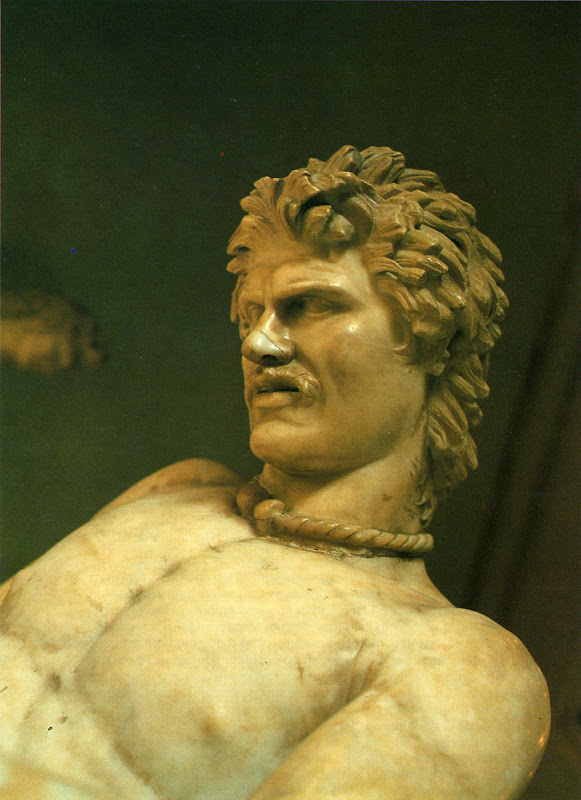
Details "Dying Gaul"
The defensive struggle
twice repulsed with great loss, the Gauls take advice on what remains to be do. They appeal to people who know the country and are taught by them from the site of our strong senior and how they are fortified. There was a hill to the north who could not be understood within the confines of our trenches, because of its too large circuit, which had forced us to establish our camp on land in mid-coast and in a position necessarily unfavorable. Commanded the lieutenant C. Antistius Reginus and C. Caninius Rebilus with two legions. Having recognized the scene by their scouts, the enemy leaders form a body of sixty thousand men, chosen from the Gauls, and especially among nations that had the highest reputation for courage. They stop them secretly when and how they must act, and they set the attack in the hour of noon, and put at the head of the Arverne Vercasivellaunos troops, a relative of Vercingetorix, and one of four generals in Gaul. He goes out of his camp the first day, and having completed his route just before daybreak, he hides behind the mountain, and bases its soldiers the fatigues of the night. Around noon, he goes to that part da Roman camp we talked about earlier. At the same time the cavalry approached the fortifications in the plain, and the rest of the troops: Gallic begins to deploy in battle at the head of the camp.

the top of the citadel of Alesia Vercingetorix sees them, and leaves the place, taking the camp's long poles, covered galleries, its fake and what he had prepared for output. The battle began at once all over with eagerness, and everywhere we made the greatest efforts. A place it seems low, it is quick to run there. The excessive breadth of their fortifications prevented the Romans to keep all the points and defend them everywhere. The cries that rose behind our soldiers their printer even more terror, they were thinking that their security depended on the courage of others, often because the danger is farthest is the one who made the greatest impression on their minds.

Oppidum Mount Auxois in winter, the site of the Battle of Alesia
Caesar, who had chosen a position where he could watch all the action is carry aid wherever it is needed. From either side we feel that this day is when we must make the last effort. The Gallic despair entirely of their salvation, if they force our trenches, the Romans are not the end of their labors in the victory. The liveliest action takes place mainly to the strong level where we saw that Vercasivellaunos had been sent. Close luminary who dominated the slope was of great importance. Some of the features we are launching the other, having formed the turtle, are at the foot of the wall: fresh troops took the place of those who are tired. The land that the Gauls lay in the trenches to help them overcome them, and fills the traps that the Romans had hidden, and already the weapons and forces begin to fail us.

soon as he knows, Caesar sends this Labienus with six cohorts, and he orders him, if he can not keep, to withdraw the cohorts and make an exit, but only at the last end. He goes himself to urge others not to give in to fatigue, he told them that the fruit of all the previous fights depends on what day, this hour. The besieged, despairing of forcing the fortifications in the plain, because of their size, trying to scale the heights, and will direct all their means of attack, they hunt by a hail of missiles those fighting from the towers, they fill the ditches with earth and weirs, and make their way, they cut with the false wall and the parapet.

Caesar sends at first young Brutus, with six cohorts, then Lieutenant C. Fabius with seven others, and finally, the action becomes more intense, he carries it himself with a reinforcement of fresh troops. The fight resumed and the enemy repulsed, he goes to the point where he had sent Labienus draws four cohorts from the nearest fort, directs a portion of the cavalry to follow, and the other to do the rounds of the lines outside and take the enemy back. Labienus, seeing that neither the ramparts or ditches can not stop their fury, brings thirty-nine cohorts out of strong neighbors and that chance presents to him, and Caesar's despatch of letters, which inform his design.
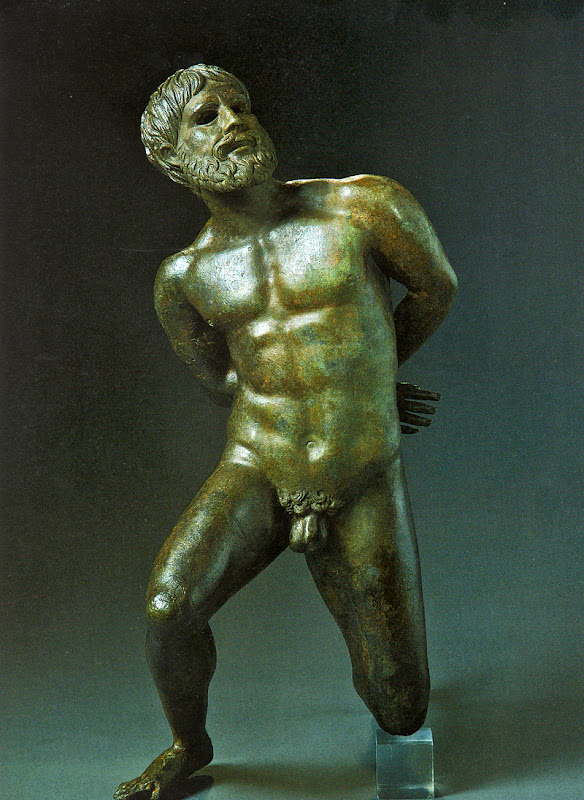
The Gallic captive - Excavations of the Rhone, Arles
Victory
Caesar Caesar hastened his walk to watch the action. Upon his arrival, recognizes the color of clothing he used to wear in battle, the enemy, who see the height on the slope with the squads and cohorts which he had brought with him, engage. A cry rises from both sides, and is repeated on the wall and in every corner. Our soldiers, leaving aside the spear, their swords. Suddenly, in the rear of the enemy, seems our cavalry approaching other cohorts, the Gauls flee, our cavalry barred the passage to the fugitives, and made a great slaughter. Sédullus, head and prince of Lemovices, is killed, and Arverne Vercasivellaunos taken alive in the rout. Sixty-four military standards are reported to Caesar, of so many men, few return to camp without injury. The besieged, seeing the tops of their walls of their flight and carnage that actually despair of their salvation, and withdraw their troops from the attack on our trenches. The news reached the camp of the Gauls, who evacuated in time. If the soldiers had not been harassed by too many commitments and work all day, the enemy might have been entirely destroyed. At midnight, the cavalry sent in pursuit, reached the rear, a large portion is taken or killed, the rest escaped by flight, took refuge in cities.
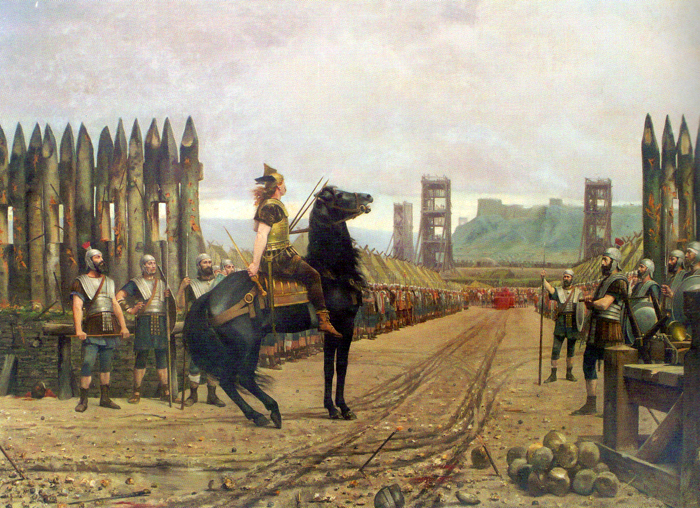
Henri Paul Motte (1846-1922) - Surrender of Vercingetorix, 1887
Surrender of Vercingetorix
The next day Vercingetorix summoned the assembly, and said: "That has not started this war for his personal interests, but for the defense of freedom; that, since we had to give to fortune, he offered to his countrymen, leaving them the choice to appease the Romans by his death or deliver it alive. "It sends this subject to Caesar. He ordered that he brings weapons , which leads him to the chiefs. Sitting on his court, at the head of his camp, he published before his enemy generals. Vercingetorix was put into his power, and the weapons are thrown at his feet. Except Aedui and Arverni, he wanted to use to try to win back these people, the remaining prisoners were distributed per capita to each soldier, as booty.

Vercingetorix throws his arms at the feet of Caesar, Lionel Royer (1852-1926), 1899
Submission Aedui and Arverni. Wintering
These cases are completed, he moved to the Aedui and receive their submission. There, deputies sent by Arverni come to promise to do what he orders. He demands a great number of hostages. He put his legions into winter quarters, and makes about twenty thousand captives to Aedui and Arverni. It is from T. Labienus with two legions and cavalry to the country Sequani him he attaches Mr. Sempronius Rutilus. He placed C. Fabius and L. Minucius Basilus with two legions from the Remi, to guarantee them against any attack Bellovaci their neighbors. Sends T. Antistius Reginus in Ambivareti, T. Sextius in Bituriges, C. Caninius Rebilus the Ruteni, each with a legion. It establishes Q. Tullius Cicero and P. Sulpicius posts Cabillo (Chalons) and Matiscon (Macon), at the Aedui on the Saone, to ensure the food. Itself resolved to spend the winter Bibracte. These events have been announced in Rome by Caesar's letters were ordered twenty days of public prayer.
Caesar, Gallic Wars, Book VII

0 comments:
Post a Comment